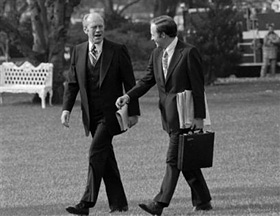 |
 |
 |
 News from Around the Americas | February 2006 News from Around the Americas | February 2006  
Telecoms Let NSA Spy on Calls
 Leslie Cauley & John Diamond - USA TODAY Leslie Cauley & John Diamond - USA TODAY


| | President Gerald Ford chats with recently named White House chief of staff Dick Cheney outside the White House in this Nov. 7, 1975 file photo. Newly disclosed historic documents obtained by the Associated Press show that an intense debate erupted during the Ford Administration over the president's powers to eavesdrop without warrants for foreign intelligence purposes. (AP/Bob Daugherty) |
The National Security Agency has secured the cooperation of large telecommunications companies, including AT&T, MCI and Sprint, in its efforts to eavesdrop without warrants on international calls by suspected terrorists, according to seven telecommunications executives.

The executives asked to remain anonymous because of the sensitivity of the program. AT&T, MCI and Sprint had no official comment.

The Senate Judiciary Committee begins hearings today on the government's program of monitoring international calls and e-mails of a domestic target without first obtaining court orders. At issue: whether the surveillance is legal, as President Bush insists, or an illegal intrusion into the lives of Americans, as lawsuits by civil libertarians contend. (Related: Committee chief says program violates law)

In domestic investigations, phone companies routinely require court orders before cooperating.

A majority of international calls are handled by long-distance carriers AT&T, MCI and Sprint. All three own "gateway" switches capable of routing calls to points around the globe. AT&T was recently acquired by SBC Communications, which has since adopted the AT&T name as its corporate moniker. MCI, formerly known as WorldCom, was recently acquired by Verizon. Sprint recently merged with Nextel.

The New York Times, which disclosed the clandestine operation in December, previously reported that telecommunications companies have been cooperating with the government, but it did not name the companies involved. (Related: Bush says NSA program is legal)

Decisions about monitoring calls are made in four steps, according to two U.S. intelligence officials familiar with the program who insisted on anonymity because it remains classified:

• Information from U.S. or allied intelligence or law enforcement points to a terrorism-related target either based in the United States or communicating with someone in the United States.

• Using a 48-point checklist to identify possible links to al-Qaeda, one of three NSA officials authorized to approve a warrantless intercept decides whether the surveillance is justified. Gen. Michael Hayden, the nation's No. 2 intelligence officer, said the checklist focuses on ensuring that there is a "reasonable basis" for believing there is a terrorist link involved.

• Technicians work with phone company officials to intercept communications pegged to a particular person or phone number. Telecommunications executives say MCI, AT&T and Sprint grant the access to their systems without warrants or court orders. Instead, they are cooperating on the basis of oral requests from senior government officials.

• If the surveillance yields information about a terror plot, the NSA notifies the FBI or other appropriate agencies but does not always disclose the source of its information. Call-routing information provided by the phone companies can help intelligence officialseavesdrop on a conversation. It also helps them physically locate the parties, which is important if cellphones are being used. If the U.S. end of a communication has nothing to do with terrorism, the identity of the party is suppressed and the content of the communication destroyed, Hayden has said.

The government has refused to publicly discuss the precise number of individuals targeted.

The Times and The Washington Post have said thousands have had communications intercepted.

The two intelligence officials said that number has been whittled down to about 600 people in the United States who have been targeted for repeated surveillance since the Sept. 11 attacks. | 
 | |
 |



